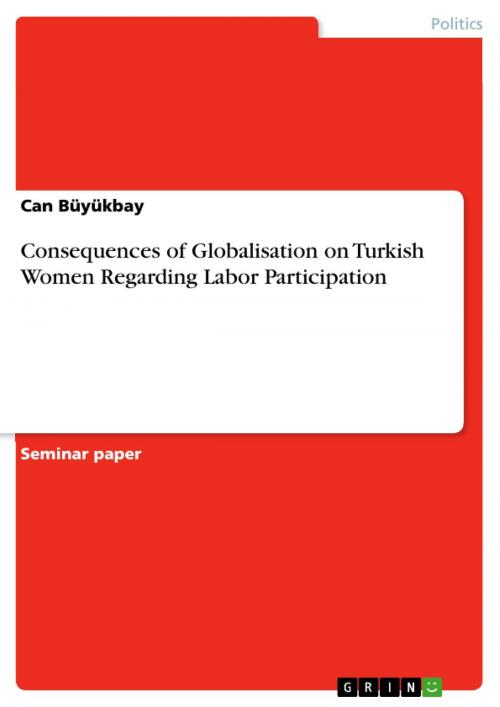Consequences of Globalisation on Turkish Women Regarding Labor Participation
Nonfiction, Social & Cultural Studies, Political Science| Author: | Can Büyükbay | ISBN: | 9783640527946 |
| Publisher: | GRIN Publishing | Publication: | February 4, 2010 |
| Imprint: | GRIN Publishing | Language: | English |
| Author: | Can Büyükbay |
| ISBN: | 9783640527946 |
| Publisher: | GRIN Publishing |
| Publication: | February 4, 2010 |
| Imprint: | GRIN Publishing |
| Language: | English |
Seminar paper from the year 2009 in the subject Politics - International Politics - Topic: Miscellaneous, grade: 5 (Schweiz), University of Bern (Geographisches Institut), course: Politische Geographie, language: English, abstract: Globalisation is marked by growing economic interdependence and internationalisation of capital. Some of the important characteristics of this phenomenon are the increasing interconnectedness between societies as a result of the rapid development of communications and growing trade, the invention of new technologies, increased capital mobility and the growing importance of transnational corporations (McGrew 2005: 22). It became increasingly clear that globalization was, from the beginning, a process based on gender discrimination, which meant it affected men and women differently in an economic, social and cultural sense. Global markets, free production zones, and new growth strategies make women the victims of development programmes. In Thailand, Bangladesh, Mexico, China and in many areas of the so-called 'Third World', western capital exploits the cheapest workforce. The governments there have offered their young women to the international capital and were willing to create so-called 'free production zones' in which the capital has great freedom. Free production zones are being strongly criticised, because foreign companies do not need to respect any labour protection laws in these areas, and have plenty of room to manoeuvre and to pursue their interests. Critics come too, because the companies don't need to consider the damage to the environment (Kümbetoglu/Caga 2001: 58).
Seminar paper from the year 2009 in the subject Politics - International Politics - Topic: Miscellaneous, grade: 5 (Schweiz), University of Bern (Geographisches Institut), course: Politische Geographie, language: English, abstract: Globalisation is marked by growing economic interdependence and internationalisation of capital. Some of the important characteristics of this phenomenon are the increasing interconnectedness between societies as a result of the rapid development of communications and growing trade, the invention of new technologies, increased capital mobility and the growing importance of transnational corporations (McGrew 2005: 22). It became increasingly clear that globalization was, from the beginning, a process based on gender discrimination, which meant it affected men and women differently in an economic, social and cultural sense. Global markets, free production zones, and new growth strategies make women the victims of development programmes. In Thailand, Bangladesh, Mexico, China and in many areas of the so-called 'Third World', western capital exploits the cheapest workforce. The governments there have offered their young women to the international capital and were willing to create so-called 'free production zones' in which the capital has great freedom. Free production zones are being strongly criticised, because foreign companies do not need to respect any labour protection laws in these areas, and have plenty of room to manoeuvre and to pursue their interests. Critics come too, because the companies don't need to consider the damage to the environment (Kümbetoglu/Caga 2001: 58).















